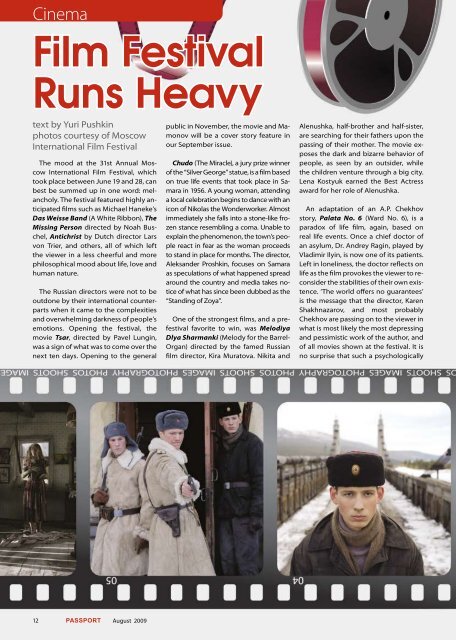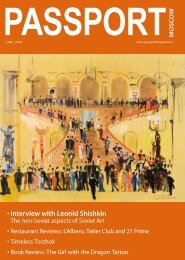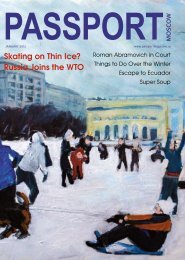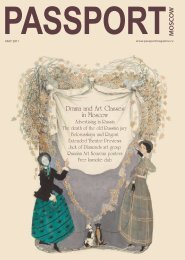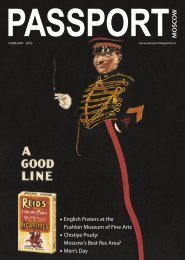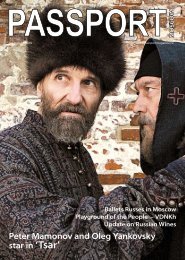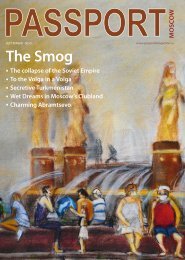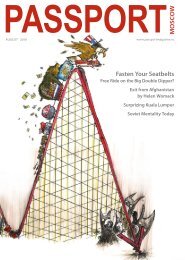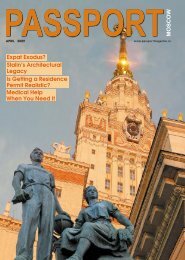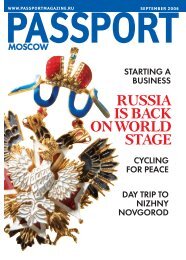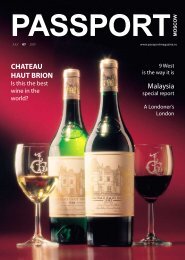MO SC O W HOW DO YOU DO... MOSCOW! - Passport magazine
MO SC O W HOW DO YOU DO... MOSCOW! - Passport magazine
MO SC O W HOW DO YOU DO... MOSCOW! - Passport magazine
Create successful ePaper yourself
Turn your PDF publications into a flip-book with our unique Google optimized e-Paper software.
Cinema<br />
Film Festival<br />
Runs Heavy<br />
text by Yuri Pushkin<br />
photos courtesy of Moscow<br />
International Film Festival<br />
The mood at the 31st Annual Moscow<br />
International Film Festival, which<br />
took place between June 19 and 28, can<br />
best be summed up in one word: melancholy.<br />
The festival featured highly anticipated<br />
films such as Michael Haneke’s<br />
Das Weisse Band (A White Ribbon), The<br />
Missing Person directed by Noah Buschel,<br />
Antichrist by Dutch director Lars<br />
von Trier, and others, all of which left<br />
the viewer in a less cheerful and more<br />
philosophical mood about life, love and<br />
human nature.<br />
The Russian directors were not to be<br />
outdone by their international counterparts<br />
when it came to the complexities<br />
and overwhelming darkness of people’s<br />
emotions. Opening the festival, the<br />
movie Tsar, directed by Pavel Lungin,<br />
was a sign of what was to come over the<br />
next ten days. Opening to the general<br />
2 August 2009<br />
public in November, the movie and Mamonov<br />
will be a cover story feature in<br />
our September issue.<br />
Chudo (The Miracle), a jury prize winner<br />
of the “Silver George” statue, is a film based<br />
on true life events that took place in Samara<br />
in 1956. A young woman, attending<br />
a local celebration begins to dance with an<br />
icon of Nikolas the Wonderworker. Almost<br />
immediately she falls into a stone-like frozen<br />
stance resembling a coma. Unable to<br />
explain the phenomenon, the town’s people<br />
react in fear as the woman proceeds<br />
to stand in place for months. The director,<br />
Aleksander Proshkin, focuses on Samara<br />
as speculations of what happened spread<br />
around the country and media takes notice<br />
of what has since been dubbed as the<br />
“Standing of Zoya”.<br />
One of the strongest films, and a prefestival<br />
favorite to win, was Melodiya<br />
Dlya Sharmanki (Melody for the Barrel-<br />
Organ) directed by the famed Russian<br />
film director, Kira Muratova. Nikita and<br />
Alenushka, half-brother and half-sister,<br />
are searching for their fathers upon the<br />
passing of their mother. The movie exposes<br />
the dark and bizarre behavior of<br />
people, as seen by an outsider, while<br />
the children venture through a big city.<br />
Lena Kostyuk earned the Best Actress<br />
award for her role of Alenushka.<br />
An adaptation of an A.P. Chekhov<br />
story, Palata No. 6 (Ward No. 6), is a<br />
paradox of life film, again, based on<br />
real life events. Once a chief doctor of<br />
an asylum, Dr. Andrey Ragin, played by<br />
Vladimir Ilyin, is now one of its patients.<br />
Left in loneliness, the doctor reflects on<br />
life as the film provokes the viewer to reconsider<br />
the stabilities of their own existence.<br />
‘The world offers no guarantees’<br />
is the message that the director, Karen<br />
Shakhnazarov, and most probably<br />
Chekhov are passing on to the viewer in<br />
what is most likely the most depressing<br />
and pessimistic work of the author, and<br />
of all movies shown at the festival. It is<br />
no surprise that such a psychologically


